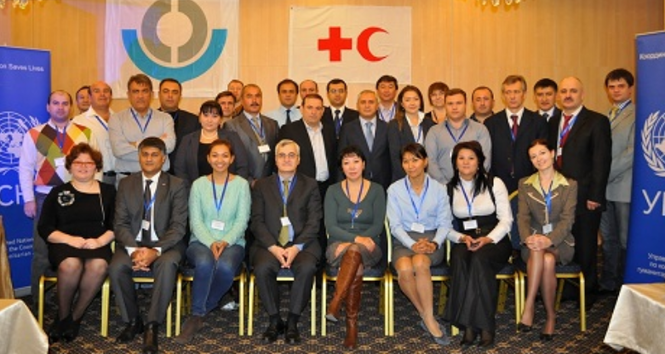
Recent months have seen notable success in the promotion of disaster law in Eastern Europe and Central Asia. Headlines were made in Astana, Bishkek, Dushanbe, and St Petersburg, where important steps were taken to strengthen national and regional legislative instruments for disaster response.
In November, the IFRC and the Collective Security Treaty Organization (CSTO) detailed plans to strengthen their cooperation in the sphere of disaster preparedness and response. Meeting in St Petersburg, Russia on the 25th, Anitta Underlin, IFRC’s Director for Europe, and Nikolay Bordjuza, CSTO Secretary General, signed a Plan of Action for 2014-2015. The Plan includes information sharing and training, and offers a new platform for the promotion of disaster law in the six CSTO member-states (Armenia, Belarus, Kazakhstan, Kyrgyzstan, Russia, and Tajikistan). The Plan was put into action just days later, when IFRC was invited to deliver an introductory presentation on disaster law to a session of the Expert-Consultative Council of the CSTO Parliamentary Assembly in St Petersburg on 27 November. During that session, the Council adopted a special resolution on further adoption of recommendations for CSTO member states regarding disaster relief.
Advancing another collaborative partnership with an important legislative player in the CIS region, the CIS Inter-Parliamentary Assembly’s Permanent Commission for Social Policy and Human Rights, in collaboration with IFRC, hosted a seminar on the regulation of disaster response in Dushanbe, Tajikistan in September. Through the seminar, members of the Commission were acquainted with common problems of regulation in the field of international disaster response, the various reference tools developed by IFRC to address these issues, and the experience of Tajikistan and Kazakhstan in using these tools. One specific outcome of the seminar was the decision to include in the CIS Inter-Parliamentary Assembly’s workplan for 2014-2015 adaptation of the Model Act on IDRL to the CIS context for further consideration and adoption by the Assembly.
In Central Asia, Bishkek, Kyrgyzstan was host to the Regional Ministerial Conference from 16 to 18 October. The Conference brought together more than 120 professionals, practitioners and delegates from Kazakhstan, Tajikistan, Kyrgyzstan and Afghanistan, as well as from various institutions working at regional and sub-regional levels. The technical level discussions in the Conference were built around the ongoing initiatives of regional cooperation in Central Asia: risk assessment, information management and monitoring at national and regional levels; further development and priorities of a regional strategy on disaster risk reduction; creation of an enabling environment (refining legal framework) for further strengthening collaboration at regional level; perspectives of collaboration of Central Asia with Afghanistan; capacity building for cross-border response and emergency aid for Disaster Management Authorities and Response Services of Central Asian countries. Based on the discussions at the Conference, we can expect governments in the region to take steps to consolidate efforts to strengthen regional cooperation in the area of disaster risk reduction. This Conference also adopted recommendations to support further efforts to strengthen international and national mechanisms on risk reduction and disaster response and to improve national legislation defining the legal status of the National Societies.
Just over a week later in Astana, Kazakhstan a Regional Seminar on the Role of Customs in Disaster Response gathered representatives from customs and emergency authorities and National Societies from Armenia, Azerbaijan, Belarus, Georgia, Kazakhstan, Kyrgyzstan, Moldova and Tajikistan. The seminar, organized jointly by the World Customs Organization, UN OCHA, and IFRC, aimed to define customs strategies to facilitate the clearance of humanitarian goods for an effective and timely response in emergencies. The seminar served as a platform for open dialogue and experience sharing on humanitarian operations management among customs officials and key humanitarian actors. It also raised awareness among related governmental agencies on the importance of national mechanisms to effectively manage the international disaster assistance. We can expect this to be put to direct use as the participants implement the Plan of Action developed during the seminar to improve preparedness to facilitate and regulate future relief consignments at the national and regional levels.